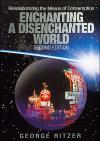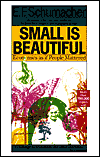The Economics of Simplicity: Review Essay (series)
No textbook on the economics of simplicity exists, of course. There is no complete formulae or prescriptions or how-to. Instead, to build an economy of simplicity would require seeking out principled approaches to how economic relations (goods, services, exchange values, productivity, consumption, etc.) work best to promote or foster simplicity. Here are a few books that describe well what to look for, attend to, or be conscious of. (Titles will be added successively.)
 Enchanting a Disenchanted World: Revolutionizing the Means of Consumption, by
George Ritzer. Thousand Oaks, CA: Sage Publications, 2004 (2nd edition); Pine Forge Press, 1999.
(1st edition)
Enchanting a Disenchanted World: Revolutionizing the Means of Consumption, by
George Ritzer. Thousand Oaks, CA: Sage Publications, 2004 (2nd edition); Pine Forge Press, 1999.
(1st edition)
The premise of Ritzer's book is that the means of consumption in the United States (but extrapolate to the rest of the developed world and the values of the aspiring classes of the developing world) have changed in the past half-century to the point that consumption itself has become a cultural and a psychological activity tantamount to religion and ideology.
Consumption is no longer a satisfaction of temporal needs but a search for pleasurable experiences, a life style in perpetual pursuit of enchantment. The new means of consumption involve new settings or structures for seeking the enchantment experiences, which Ritzer describe as "cathedrals of consumption." This is aptly named because the phrase describes the gargantuan scale of the venues today: theme park, casino, cruise, film theater, music, sports, convention, restaurant, and superstore.
Since World War II, Western economies have moved all economic spheres toward corporate settings. As profit increases, a cycle occurs: share-holder expectation of increased profit. To increase profit, new products are marketed, new "needs" pitched, and more consumption urged upon old consumers and newly recruited consumers, especially young people and people in the developing world. Technology has facilitated production, advertising, and especially consumption, with the spread of credit and the enticement to debt. The result is hyperconsumption.
In order to maintain this frenzied rate of consumption, corporations must "enchant" consumers, make them feel that consumption is their heart and soul, their life's purpose. Goods and services are insufficient to this end. Marketing of lifestyles and the positive value of consumption as an end becomes necessary.
Ritzer uses Marxian, Weberian, and postmodern social theory to dissect the authority structures, bureaucracies, and capitalist premises of modern economic activity, especially the notions of disenchantment and enchantment. There are not many technical terms but rather logic and description. Though sometimes too exhaustive in describing the cathedrals and their plaudits, Ritzer does make his point clearly.
Where reform movements have pointed to the ethical issues of consumption in the past (think of the vice of gluttony and the virtue of moderation), corporate apologists of today point to the utilitarian, the psychological, and the material to champion profit, pleasure, and patriotism. The enchantment process behind the cathedrals of consumption are quasi-religious, and have overthrown arguments about labor, wages, conditions, and environment. Simplicity can be marketed in this mix but usually it is seen as repressive and "uncool" (not Ritzer's description).
The apologists for consumption have successfully rationalized the new means of consumption so that the average person never disputes that consuming a lot of things or being able to do so at will is the best way to live.
Ritzer spends time discussing the social implications of the new means of consumption. He touches on the homogenization of culture, the sanitizing of cultural differences and individual expression, and the transformation of consciousness so that all moral perspectives are filtered first through corporate media and corporate definitions of morality and behavior. He describes the "ever-escalating need for spectacle," the artificial experience of the onlooker who no longer does anything but watches what is presented to him by others.
Ultimately, we need to understanding what is going on around us. And we may interest ourselves in the mechanics of what is going on. For this purpose Ritzer's book does provide a handy diagnosis and overview. But, as he puts it, "the immediate issue is how to live a more meaningful life within a society increasingly defined by consumption." And for this we must invest time and effort in seeing how economics was done in the past and is done today, and how it can be done differently.

Small is Beautiful: Economics as if People Mattered, by E. F. Schumacher. London: Blond & Briggs; New York: Harper & Row, 1973. 25th anniversary edition with commentaries: Point Roberts, WA and Vancouver, BC: Hartley & Marks, 1999.
E. F. Schumacher (1911-77) was a trained economist working for the National Coal Board of Britain and had a command of systems economic theory, which is to say conventional institutional and big business economics. But Schumacher offered an alternative to every point of contact with corporate economics, namely, a concept of right livelihood derived from Buddhist thought, nature as spiritual sanctuary rather than material resource, and the priority of ecosystems and the environment as the basis for an economics of simplicity.
Of course, these concepts were not original or exclusive to Schumacher, though he spoke more originally and concisely than most contemporaries. But he was inspired directly by his work with non-government organizations around the world, and by his readings of non-Western economic thought, unusual for the 1970's. Paul Hawkins, the environmentalist, describes Small is Beautiful as "one of those rare books -- a book that can inform a lifetime." And, indeed, an economics of simplicity takes a life's dedication.
Schumacher helped popularize several basic concepts: environmentalism as spiritual versus utilitarian, natural capitalism versus economic or material capitalism. Financiers and politicians believe they have solved the problem of production for modern times, but Schumacher considers their belief an illusion and a fateful error. The modern economic system "consumes the very bases on which it has been erected," he writes. "It lives on irreplaceable capital which it cheerfully treats as income." The modern world is on a "collision course" with its own assumed moral values and, indeed, its own survival.
Schumacher sets out to present a different economics, and this is the economics of simplicity (though he never uses the term). He offers juxtapositions or poles throughout his introductory sketch of economic factors. Pulled into a table -- with some terms not his own -- they might look something like this:
|
profitability |
sustainability |
| globalization | communitarianism |
| material capital | human capital |
| quantity | quality |
| growth | qualitative distinctions |
| market priority | incommensurability |
| means | ends |
| derived economics | natural economics |
Large countries, cities, and business entities have traditionally been viewed as the most viable -- but not in terms of need. A duality exists naturally, so that the virtues of freedom and autonomy are preserved by size. But after a certain point, size does not improve viability or freedom. "We suffer from an almost universal idolatry of gigantism," concludes Schumacher.
Size makes uneven distribution of natural resources. Cycles of growth and stagnation are human-made lurchings of size and excess. Mobility makes for vulnerability, while simplicity provides a natural ordering of priorities, a natural rationale for the need for governmental or institutional growth. Viability should refer to people not to organizations or institutions. (Witness the modern inversion of this principle, where corporations have identities for the purpose of rights that override the rights of individuals, an extension of stateism.) The flexibility of response and the usefulness of institutions to people is directly related to size.
Schumacher notes the most important venues where size is especially relevant: education, land use, and technology. By education he means a systemic study of our context and culture, our values and priorities. Education and research need to address "the true problems of living," reconciling opposites and divergent problems. By land use, Schumacher was prophetically calling for a wise stewardship and harmonious sustainability in the light of the then-new science of ecology.
In subsequent chapters, Schumacher applies his experience in Asia to elaborate on viable economic and technological solutions. In straightforward layperson's language, he describes the principles of subsidiarity or subsidiary function, vindication, identification, and the middle axiom. Sounds complicated, but Schumacher is careful, plain, low-key, and explains each concept, even if in introductory fashion. His arguments are clear, non-technical, and logical, not emotional or romantic, and hold their own against any economist.
Schumacher advocates what he calls the "quasi-firm" as the quintessential production entity. There is a rich tradition of craftsmanship, guilds, and grass roots here. The subtitle of the book guides both heart and head. He goes on to refute the outdated models of capitalism and socialism (based on growth and centralization), instead redefining ownership in light of his new economic principles. Here are the makings of a true economics of simplicity.
In his most provocative and interesting chapter, entitled "Buddhist Economics," Schumacher explores the Buddhist principle of right livelihood to argue that a Buddhist economics would distinguish between misery, sufficiency, and excess, whereas modern economics does not. Economic growth would be valued only until a point of efficiency or sufficiency is reached, not limitless growth contriving higher and higher levels of consumption.
An economics of permanence and sustainability would contrast with an economics of non-renewability and rapacity. New patterns of livelihood and production would emerge. A shift would emerge centering "local resources for local needs." Stability in an individual's environment and social context, ownership, and consumption would emphasizes means not ends, for the ends would be natural and a reflection of values.
Schumacher was influence by his stays in 1950's Burma with Buddhist scholars and by close reading of Gandhian writers. Small is Beautiful is still timely and refreshing today, when an economics of simplicity is more widely if understood if not modestly discussed. The book and the person show us what should not and what should be the context of our lives.
¶